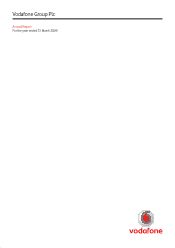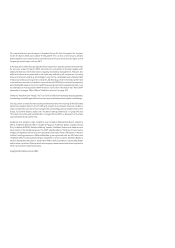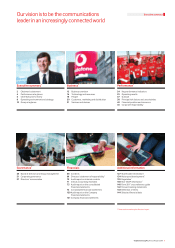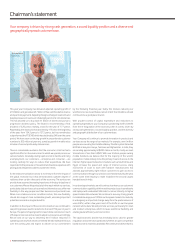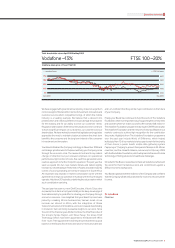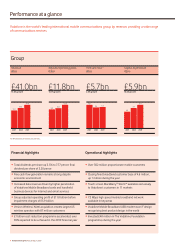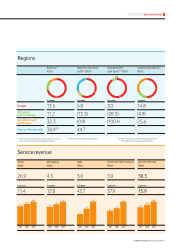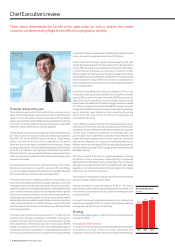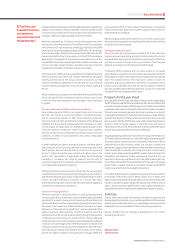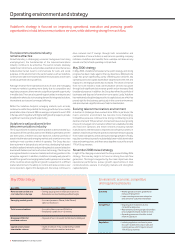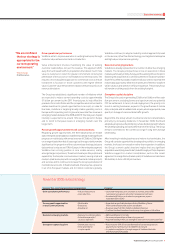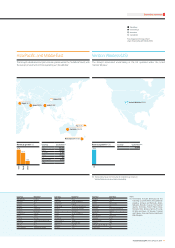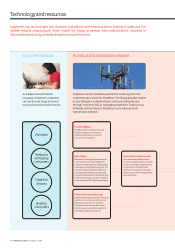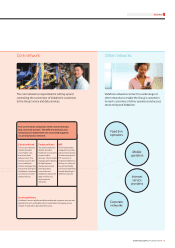Vodafone 2009 Annual Report Download - page 9
Download and view the complete annual report
Please find page 9 of the 2009 Vodafone annual report below. You can navigate through the pages in the report by either clicking on the pages listed below, or by using the keyword search tool below to find specific information within the annual report.
Vodafone Group Plc Annual Report 2009 7
include bundled mobile data and fixed broadband options. SuperFlat net
additions have remained strong at 404,000 in the last quarter. Similar
concepts of value enhancement products have been launched in most
European markets, including Italy, Spain, the UK and Ireland.
We have accelerated our £1 billion cost reduction programme, which
will help us to of fset the pressures of cost inflation and the competitive
environment and invest in revenue growth opportunities. In the 2009
financial year, we achieved approximately £200 million of cost savings,
which were partially offset by restructuring charges. We now intend to
deliver at least 65% of the total programme in the 2010 financial year,
ahead of plan. The benefits of the programme are visible in our results.
In the 2009 financial year, despite significant increases in mobile voice
minutes and data usage, Europe’s operating expenses remained
broadly flat and mobile contribution margins were stable.
Since November 2008: we have established the Vodafone Roaming
Services business unit, which will manage international wholesale
roaming activities across the Group; we have outsourced our field
network maintenance operations in the UK; and we have executed
network sharing arrangements across Germany, Ireland, Spain and
the UK.
We are reviewing our programme to identify further ways in which the
Group can benefit from its regional scale and further reduce costs
in order to offset external pressures and competitor action and invest
in growth.
Pursue growth opportunities in total communications
Data revenue grew by 25.9% on an organic basis and is now over
£3 billion. We continue to push penetration of handheld business
and PC connectivity devices. In April, Verizon Wireless joined the
Joint Innovation Lab (‘JIL’) established by Vodafone, China Mobile and
SoftBank. The JIL is creating a single platform for developers to create
mobile widgets and applications on multiple operating systems and
access the partners’ combined 1.1 billion customer base. Vodafone
will also provide access to third parties to billing, location and other
platforms, to enhance user experience and create a favourable
environment for all.
In fixed broadband, we have continued to grow our customer base in
Italy and Spain, and in Germany, returned to revenue growth in the
fourth quarter. We now have 4.6 million customers, an increase of
around 1 million during the year, of which 0.6 million arose in the
second half. The addition of appropriate quality fixed broadband
capability is increasing the range of products we can offer to
customers, in particular in enterprise, and providing us with the ability
to compete with integrated competitors.
Europe’s enterprise revenue grew by 1.2% during the year, ahead of
overall business trends, demonstrating the progress we are making to
address the enterprise opportunity. Vodafone Global Enterprise, which
serves our larger enterprise customers on a Group-wide basis,
delivered revenue growth of around 9%, demonstrating the appeal of
Vodafone to multinational corporations.
Execute in emerging markets
We have continued to drive penetration in India, generating strong
revenue growth from our brand and commercial offers and a substantial
investment in network coverage. Indus Towers, our infrastructure joint
venture with Bharti and Idea, began operating during the financial year.
We expect Indus Towers will enable Vodafone to increase its capital
efficiency in India and also to benefit from revenue generated from
selling capacity to other operators. Growth at Vodacom, which has
strengthened its total communications offering through the acquisition
of Gateway, has been strong. Our performance in Turkey, where we
remain focused on our turnaround plan, has been disappointing. We will
continue to invest throughout the 2010 financial year to relaunch the
company. In Qatar, the Group commenced operations after the end of
the financial year, having been awarded the second licence with its
partner, the Qatar Foundation, during the year. In August 2008, the
Group acquired 70.0% of Ghana Telecommunications, an integrated
mobile and fixed line telecommunications operator, which has since
been rebranded to Vodafone.
Whilst emerging markets are of interest to us, we remain cautious and
selective on future expansion. Our primary focus will remain on driving
results from our existing assets.
Strengthen capital discipline
During the year we returned approximately 87% of free cash flow
before licence and spectrum payments to shareholders in the form of
dividends and share buy backs. Net debt has increased to £34 billion,
primarily as a result of foreign currency movements. The Group has
retained a low single A credit rating in line with its target.
In February 2009, consistent with our active stance on in-market
consolidation, we agreed to merge Vodafone Australia with Hutchison
3G Australia to create a new jointly owned company which will operate
under the Vodafone brand. This transaction, which is subject to
regulatory approval, is expected to generate cost synergies with a
present value of AUS$2 billion and will release capital to Vodafone
through a AUS$0.5 billion deferred payment. Customers in Australia
will benefit from the enlarged entity’s scale.
Prospects for the year ahead
In Europe and Central Europe, operating conditions will be challenging in
the 2010 financial year. IMF forecasts indicate a GDP decline of 4% in 2009
across the Vodafone footprint within Europe and Central Europe and that
unemployment could increase significantly. In these markets, we expect
that voice and messaging revenue trends will continue as a result of
ongoing pricing pressures and slowing usage. However, we expect further
growth in data revenue. In Turkey, where we will focus on our turnaround
plan, we expect that the 2010 financial year will be challenging. Revenue
growth in other emerging markets, in particular India and Africa, is
expected to continue as we drive penetration in these markets. We expect
another year of good performance at Verizon Wireless.
Adjusted operating profit is expected to be in the range of £11.0 billion to
£11.8 billion. We have widened our outlook for adjusted operating profit
this year to reflect current economic uncertainty. Performance will be
determined by actual economic trends, our success in closing the
performance gaps we have identified in certain markets and the extent
to which we decide to reinvest cost savings into total communications
growth opportunities. Underlying EBITDA margins, before the impact of
acquisitions and disposals, foreign exchange and business mix, are
expected to decline by a similar amount to the 2009 financial year. This
trend reflects the benefit of the acceleration of the Group’s cost savings
programme in a weaker revenue environment. Overall Group EBITDA
margin is expected to decline at a slightly slower rate.
Free cash flow before licence and spectrum payments is expected to be
in the range of £6.0 billion to £6.5 billion, ahead of our medium term
target to deliver between £5.0 and £6.0 billion annual free cash flow. We
intend to maintain European capital intensity at around 10% of revenue
and to continue to invest significantly in India. Capital expenditure is
expected to be similar to last year after adjusting for foreign currency.
Summary
Overall, these results reflect the benefits of Vodafone’s exposure to a
diverse range of economies, our successful exploitation of data services
and the opportunities derived from our regional approach, as well as the
initial impact of our accelerated £1 billion cost savings programme.
We are confident that our strategy is appropriate for the current
operating environment.
Vittorio Colao
Chief Executive
87% of free cash
flow before licence
and spectrum
payments returned
to shareholders
Executive summary

